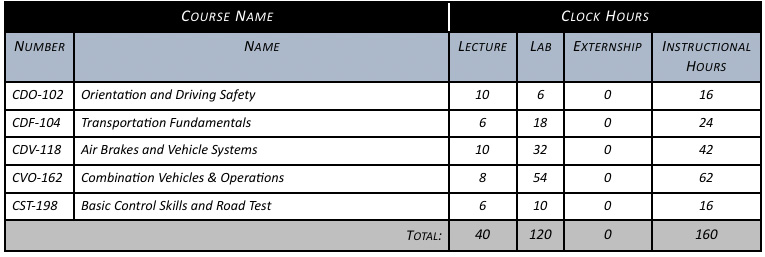Class B CDL
1 Month – Total Clock Hours: 160
2023/2024 Tuitions Fees: $4,420
Admission Requirements
Application Fee, Application for Admission, Enrollment Agreement, High School Diploma or GED, Criminal Record Check, Child Abuse Clearance.
Program Overview
The Class B CDL Certificate Program (“Program”) is designed to provide the student with industry-current training and knowledge to qualify to obtain a Class B CDL certification and subsequently gain entry level employment as a Class B CDL operator. The Program features instruction on vehicle safety, driving procedures & safety, trip planning, logbook practices, and public and employee relations. In addition to classroom instruction, driving skills tests, and practice examinations, students receive simulation, off road, over-the-road training on rural, highway, and city driving training.
Maximum # of Students Per Class: 12
Program starts on the following days: April 4th, July 25th, and October 3rd.
Entry-Level Career Opportunities:
- Light Truck Operator
- Bus Driver
- Dump Truck Operator
- Mover, Moving Specialist
Courses In This Program Include:

Course Descriptions
CDO-102 – Orientation and Driving Safety
In the Orientation and Driving Safety course, students prepare, test, and complete their CDL Permits and Endorsements. Students familiarize themselves with the driving and transportation industry and are taught the basics of each vehicle class and gross weight. Students are taught the rules and regulations from the Federal Motor Carrier Safety Administration (“FMCSA”) and state / federal Department of Transportation (“DOT”). Students are also taught the fundamentals of safe vehicle operations. (10 Lecture Hours – 6 Lab Hours)
CDF-104 – Transportation Fundamentals
In the Transportation Fundamentals course, students begin industry-current practice, in the institution’s driving range, with commercial vehicles. This training also includes vehicle inspections, practice backing, parking, and basic driving skills. Students also utilize CPI’s Trans Sim IV Simulator in this course. Students practice on Class B equipment, both manual and automatic transmission systems. Students also are taught the basic fundamentals of cargo safety, legal weight limits, and common class B equipment practices (dump trucks, triaxles, and passenger buses). (6 Lecture Hours – 18 Lab Hours)
CDV-118 – Air Brakes and Vehicle Systems
The Air Brakes and Vehicle Systems course reviews the fundamentals of Class B air brake systems on commercial vehicles, air compressor systems, air storage tanks, safety valves, and foundation brakes (s-cam, disc, and wedge). Students are taught the fundamentals of inspection of systems and operate CPI Class B equipment equipped with air brake systems. Students are also taught vehicle systems specific to designated equipment and interact with instructors reviewing both on-road and off-road driving skills. (10 Lecture Hours – 32 Lab Hours)
CVO-162 – Combination Vehicles & Operations
The Combination Vehicles and Operations, B Equipment course highlights combination vehicles and operations of Class B equipment. Combination vehicle safety, rollover risks, prevention of trailer skids, wide turns, and backing with a trailer are emphasized in CVO-162. Also taught in CVO-162 is the coupling and uncoupling of combination vehicles, vehicle positioning, disconnection of air lines, inspection of combination vehicles, and general coupling systems. Students conclude this course by practicing their driving skills both on-road and off-road.
(8 Lecture Hours – Lab Hours)
CVO-162 – Combination Vehicles & Operations
In the Class B Basic Control Skills and Road Test course, the student prepares for their DOT basic skills and road test and culminates in the PENNDOT CDL B test. Students practice in the following six components of the PENNDOT exam: Straight line back, right offset back, left offset back, conventional parallel park, driver’s side parallel park, and ninety-degree alley dock. Students also prepare for their on-road exam. The driver’s examination consists of a requirement of meeting a minimum of 67 points on a 90-point test. Students practice with instructors to pass their simulated DOT exam. The course concludes with the administration of the DOT exam. Students also prepare for post program employment. Post program preparation includes meeting with company recruiters, completing employer applications, and utilization of CPI’s Career Connection Placement system. (6 Lecture Hours – 10 Lab Hours)
